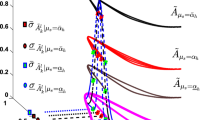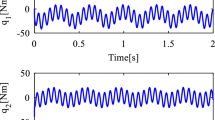Abstract
An adaptive fuzzy backstepping optimal control method is developed for modular robot manipulators (MRMs) via value iteration (VI). This paper adopts joint torque feedback (JTF) technique to construct subsystem dynamics model, and the state space description is deduced. According to fusion function which contains the error in joint angular velocity and position, the cost function is established. The integral reinforcement learning (IRL) is integrated into the VI algorithm, which solves the optimal tracking control issue without system drift dynamics. For purpose of improving the control effect, the optimal tracking control issue of manipulator can be reconsidered as the optimal compensation issue which adopting the local dynamics information. Then the uncertainty in the model can be compensated by an adaptive fuzzy backstepping compensation controller which is constructed by fuzzy logic system (FLS) and backstepping control method. The optimal compensation control strategy is adopted to deal with the interconnected dynamic coupling (IDC), which contains global information about each joint. Based on the VI algorithm and adaptive dynamic programming (ADP) method, an effective solution of Hamiltonian-Jacobi-Bellman (HJB) equation is presented. According to Lyapunov theorem, the trajectory tracking error is uniformly ultimately bounded (UUB) by using the adaptive fuzzy backstepping optimal control method. Finally, the effectiveness of the proposed method is verified by experiments.















Similar content being viewed by others
Explore related subjects
Discover the latest articles, news and stories from top researchers in related subjects.Data availability
Data will be made available upon reasonable request.
References
Hoernicke, M., Stark, K., Schoch, N.: Modular engineering of conventional plants: using MTP for world-scale industry plants. ATP Mag. 63(4), 62–68 (2022)
An, T., Wang, Y., Liu, G., Li, Y., Dong, B.: Cooperative game-based approximate optimal control of modular robot manipulators for human-robot collaboration. IEEE Trans. Cybernetics 53(7), 4691–4703 (2023)
Hauser, S., Mutlu, M., Léziart, P.: Roombots extended: challenges in the next generation of self-reconfigurable modular robots and their application in adaptive and assistive furniture. Robot. Auton. Syst. 127, 103467 (2020)
Baca, J., Hossain, S.G.M., Dasgupta, P.: Modred: Hardware design and reconfiguration planning for a high dexterity modular self-reconfigurable robot for extra-terrestrial exploration. Robot. Auton. Syst. 62(7), 1002–1015 (2014)
Li, Y., Hao, X., She, Y.: Constrained motion planning of free-float dual-arm space manipulator via deep reinforcement learning. Aerosp. Sci. Technol. 109, 106446 (2021)
Ginting, M.F., Otsu, K., Edlund, J.A.: CHORD: distributed data-sharing via hybrid ROS 1 and 2 for multi-robot exploration of large-scale complex environments. IEEE Robot. Autom. Lett. 6(3), 5064–5071 (2021)
Aggravi, M., Elsherif, A.A.S., Giordano, P.R.: Haptic-enabled decentralized control of a heterogeneous human-robot team for search and rescue in partially-known environments. IEEE Robot. Autom. Lett. 6(3), 4843–4850 (2021)
Bellman, R.: Dynamic programming. Science 153(3731), 34–37 (1966)
Ciarlet, P.G., Raviart, P.A.: Maximum principle and uniform convergence for the finite element method. Comput. Methods Appl. Mech. Eng. 2(1), 17–31 (1973)
Werbos, P.: Advanced forecasting methods for global crisis warning and models of intelligence. Gen. Syst. Yearb. 22(6), 25–38 (1977)
Li, C., Ding, J., Lewis, F.L.: A novel adaptive dynamic programming based on tracking error for nonlinear discrete-time systems. Automatica 129, 109687 (2021)
Xue, S., Luo, B., Liu, D.: Adaptive dynamic programming based event-triggered control for unknown continuous-time nonlinear systems with input constraints. Neurocomputing 396, 191–200 (2020)
Zhang, H., Cui, L., Zhang, X.: Data-driven robust approximate optimal tracking control for unknown general nonlinear systems using adaptive dynamic programming method. IEEE Trans. Neural Netw. 22(12), 2226–2236 (2011)
Safaei, A., Mahyuddin, M.N.: Optimal model-free control for a generic MIMO nonlinear system with application to autonomous mobile robots. Int. J. Adapt. Control Signal Process. 32(6), 792–815 (2018)
Kong, L., He, W., Yang, C.: Robust neurooptimal control for a robot via adaptive dynamic programming. IEEE Trans. Neural Netw. Learn. Syst. 32(6), 2584–2594 (2020)
Xia, H., Guo, P.: Sliding mode-based online fault compensation control for modular reconfigurable robots through adaptive dynamic programming. Complex Intell. Syst. 8(3), 1963–1973 (2022)
Li, Y., Wei, C., An, T.: Event-triggered-based cooperative game optimal tracking control for modular robot manipulator with constrained input. Nonlinear Dyn. 109(4), 2759–2779 (2022)
Cao, L., Cheng, Z., Liu, Y., Li, H.: Event-based adaptive NN fixed-time cooperative formation for multiagent systems. IEEE Trans. Neural Netw. Learn. Syst. (2022). https://doi.org/10.1109/TNNLS.2022.3210269
Yu, D., Long, J., Chen, C.L.P., Wang, Z.: Adaptive swarm control within saturated input based on nonlinear coupling degree. IEEE Trans. Syst. Man Cybernetics Syst. 52(8), 4900–4911 (2022)
Cao, L., Pan, Y., Liang, H., Huang, T.: Observer-based dynamic event-triggered control for multiagent systems with time-varying delay. IEEE Trans. Cybernetics 53(5), 3376–3387 (2023)
Wang, X., Xu, B., Guo, Y.: Fuzzy logic system-based robust adaptive control of auv with target tracking. Int. J. Fuzzy Syst. 25(1), 338–346 (2023)
Ma, L., Huo, X., Zhao, X., et al.: Adaptive fuzzy tracking control for a class of uncertain switched nonlinear systems with multiple constraints: a small-gain approach. Int. J. Fuzzy Syst. 21, 2609–2624 (2019)
Liu, H., Li, S., Li, G., et al.: Adaptive controller design for a class of uncertain fractional-order nonlinear systems: an adaptive fuzzy approach. Int. J. Fuzzy Syst. 20, 366–379 (2018)
Yu, D., Yang, M., Liu, Y.J., Wang, Z., Chen, C.L.P.: Adaptive fuzzy tracking control for uncertain nonlinear systems with multiple actuators and sensors faults. IEEE Trans. Fuzzy Syst. 31(1), 104–116 (2023)
Li, Y., Min, X., Tong, S.: Adaptive fuzzy inverse optimal control for uncertain strict-feedback nonlinear systems. IEEE Trans. Fuzzy Syst. 28(10), 2363–2374 (2019)
Bu, X., Qi, Q.: Fuzzy optimal tracking control of hypersonic flight vehicles via single-network adaptive critic design. IEEE Trans. Fuzzy Syst. 30(1), 270–278 (2020)
Long, J., Yu, D., Wen, G., Li, L., Wang, Z., Chen, C.L.P.: Game-based backstepping design for strict-feedback nonlinear multi-agent systems based on reinforcement learning. IEEE Trans. Neural Netw. Learn. Syst. (2022). https://doi.org/10.1109/TNNLS.2022.3177461
Chang, C.W., Hsu, C.F., Lee, T.T.: Backstepping-based finite-time adaptive fuzzy control of unknown nonlinear systems. Int. J. Fuzzy Syst. 20, 2545–2555 (2018)
Sun, J., Liu, C.: Distributed fuzzy adaptive backstepping optimal control for nonlinear multimissile guidance systems with input saturation. IEEE Trans. Fuzzy Syst. 27(3), 447–461 (2018)
Li, Y., Sun, K., Tong, S.: Observer-based adaptive fuzzy fault-tolerant optimal control for SISO nonlinear systems. IEEE Trans. Cybernetics 49(2), 649–661 (2018)
Dong, B., Zhou, F., Liu, K.: Torque sensorless decentralized neuro-optimal control for modular and reconfigurable robots with uncertain environments. Neurocomputing 282, 60–73 (2018)
He, S., Fang, H., Zhang, M.: Adaptive optimal control for a class of nonlinear systems: the online policy iteration approach. IEEE Trans. Neural Netw. Learn. Syst. 31(2), 549–558 (2019)
Pang, B., Jiang, Z.P.: Adaptive optimal control of linear periodic systems: an off-policy value iteration approach. IEEE Trans. Autom. Control 66(2), 888–894 (2020)
Heydari, A.: Stability analysis of optimal adaptive control using value iteration with approximation errors. IEEE Trans. Autom. Control 63(9), 3119–3126 (2018)
Ha, M., Wang, D., Liu, D.: A novel value iteration scheme with adjustable convergence rate. IEEE Trans. Neural Netw. Learn. Syst. (2022). https://doi.org/10.1109/TNNLS.2022.3143527
Heydari, A.: Revisiting approximate dynamic programming and its convergence. IEEE Trans. Cybernetics 44(12), 2733–2743 (2014)
Mu, C., Wang, K., Qiu, T.: Dynamic event-triggering neural learning control for partially unknown nonlinear systems. IEEE Trans. Cybern. 52(4), 2200–2213 (2022)
Vamvoudakis, K.G., Vrabie, D., Lewis, F.L.: Online adaptive algorithm for optimal control with integral reinforcement learning. Int. J. Robust Nonlinear Control 24(17), 2686–2710 (2014)
Zhang, Y., Zhao, B., Liu, D.: Event-triggered adaptive dynamic programming for multi-player zero-sum games with unknown dynamics. Soft. Comput. 25(3), 2237–2251 (2021)
Dong, B., Chen, J., Pan, Q.: Event-trigger-based approximate optimal control of modular robot manipulators using zero-sum game. Opt. Control Appl. Methods (2022). https://doi.org/10.1002/oca.2893
Dong, B., Liu, K., Li, Y.: Decentralized control of harmonic drive based modular robot manipulator using only position measurements: theory and experimental verification. J. Intell. Robotic Syst. 88(1), 3–18 (2017)
Imura, J., Yokokohji, Y., Yoshikawa, T.: Robust control of robot manipulators based on joint torque sensor information. Int. J. Robot. Res. 13(5), 434–442 (1994)
Armstrong-Hélouvry, B., Dupont, P., De Wit, C.C.: A survey of models, analysis tools and compensation methods for the control of machines with friction. Automatica 30(7), 1083–1138 (1994)
Liu, G., Goldenberg, A.A., Zhang, Y.: Precise slow motion control of a direct-drive robot arm with velocity estimation and friction compensation. Mechatronics 14(7), 821–834 (2004)
Liu, G.: Decomposition-based friction compensation of mechanical systems. Mechatronics 12(5), 755–769 (2002)
Sun, K., Sui, S., Tong, S.: Fuzzy adaptive decentralized optimal control for strict feedback nonlinear large-scale systems. IEEE Trans. Cybernetics 48(4), 1326–1339 (2017)
Zhou, Q., Wang, L., Wu, C.: Adaptive fuzzy control for nonstrict-feedback systems with input saturation and output constraint. IEEE Trans. Syst. Man Cybernetics Syst. 47(1), 1–12 (2016)
Wu, X., Zhao, Y., Xu, K.: Nonlinear disturbance observer based sliding mode control for a benchmark system with uncertain disturbances. ISA Trans. 110, 63–70 (2021)
Xu, N., Zhao, X., Zong, G.: Adaptive control design for uncertain switched nonstrict-feedback nonlinear systems to achieve asymptotic tracking performance. Appl. Math. Comput. 408, 126344 (2021)
Acknowledgements
The work is supported by the National Natural Science Foundation of China (62173047), the Scientific Technological Development Plan Project in Jilin Province of China (20220201038GX), Key Laboratory of Advanced Structural Materials (Changchun University of Technology), Ministry of Education, China (ASM-202202).
Author information
Authors and Affiliations
Corresponding author
Ethics declarations
Conflict of interest
The authors declare no potential conflict of interests.
Supplementary Information
Below is the link to the electronic supplementary material.
Rights and permissions
Springer Nature or its licensor (e.g. a society or other partner) holds exclusive rights to this article under a publishing agreement with the author(s) or other rightsholder(s); author self-archiving of the accepted manuscript version of this article is solely governed by the terms of such publishing agreement and applicable law.
About this article
Cite this article
Dong, B., Jiang, H., Cui, Y. et al. Value Iteration-Based Adaptive Fuzzy Backstepping Optimal Control of Modular Robot Manipulators via Integral Reinforcement Learning. Int. J. Fuzzy Syst. 26, 1347–1363 (2024). https://doi.org/10.1007/s40815-023-01670-3
Received:
Revised:
Accepted:
Published:
Issue Date:
DOI: https://doi.org/10.1007/s40815-023-01670-3




